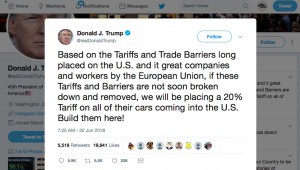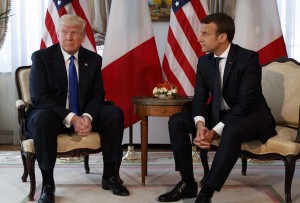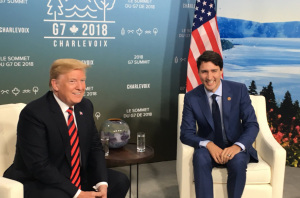
President Donald Trump issued another threat to place a tariff on EU-build vehicles coming into the U.S.
U.S. President Donald Trump doubled down on his threat to impose a 20% tariff on all European Union-assembled cars coming into the United States in a tweet this morning.
“Based on the Tariffs and Trade Barriers placed on the U.S. and it great companies and workers by the European Union, if these Tariffs and Barriers are not soon broken down and removed, we will be placing a 20% Tariff on all of their cars coming into the U.S. Build them here!” Trump wrote on Twitter.
The move comes a little more than a month after Trump asked the Commerce Department, led by Wilbur Ross, to investigate whether or not auto imports pose a national security threat.
The Commerce Department aims to wrap up its investigation into whether imports of automobiles and auto parts pose a risk to national security by late July or August, Ross said Thursday, according to Reuters.
(Makers claim Trump investigation of auto imports ill-conceived. Click Here for the story.)

President Donald Trump, left, reportedly told French President Emmanuel Macron that he wants to rid the U.S. of German cars.
Trump has been banging the drum for “fair trade” with all of the trading partners of the U.S. since early in his presidential campaign. He’s been pushing to make it a reality since his arrival in the White House.
The administration pushed for a renegotiation of the North American Free Trade Agreement, which is currently ongoing. However, the talks were expected to end last December, but have dragged out in large measure to Trump’s demands on the rules of origin related to content levels.
For now, the talks are on hiatus until after Mexico’s presidential election on July 1, but Chrystia Freeland, Canada’s lead negotiator, and Robert Lighthizer, her U.S. counterpart, recently expressed optimism at reaching a deal.
(Click Here for more about Trump wanting to drive German imports out of the U.S.)
However, the tariffs on European vehicles is a bit more complicated. During the recent G7 summit in Canada, the leaders of the EU bombarded Trump with statistics and other evidence showing that the tariff levels as currently configured are beneficial to all involved.
Trump held his ground, saying that the trade relationship between the U.S. and the EU is heavily weighted in favor of the other side. Prior to the meeting, Trump reportedly told French President Emmanuel Macron during a recent state visit that he wants to get to the point where there will be no Mercedes-Benz models driving down New York’s upscale Fifth Avenue.
If Ross finds that auto imports from the EU represent a threat to U.S. national security, the president could bypass Congress under Section 232 of the Trade Expansion Act of 1962 and directly impose new 20% tariffs compared with the 2.5% duties imposed on most auto imports today.
(To see more about Trump’s auto tariff threat triggering backlash, Click Here.)
Industry experts warn that such a move could all seriously damage automotive brands dependent upon export to the U.S., the world’s second-largest luxury car market. That move alone could be particularly harmful to high-line German marques, such as Mercedes, which could see the price of products like the S-Class jump by $25,000 or more. But the impact of new tariffs could be even harsher on mainstream brands, like Volkswagen, that compete in highly price-sensitive market segments.

